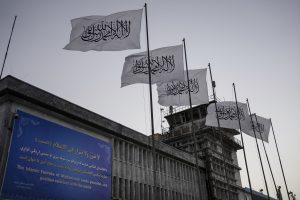The Taliban chose to mark the second anniversary of their return to power, on August 15, 2023, with much pomp and show. On a declared national holiday, which meant little for the mass of unemployed and distressed Afghans, celebrations were organized in Kabul and Kandahar. Taliban flags fluttered atop buildings and on the vehicles, motorbikes, and bicycles of young men who zoomed through the streets of both urban centers. It was an all-men show, with women mostly absent from the streets. The few who were out walked briskly, merely gazing through their veils at the incomprehensible revelry.
Shows of bravado have always been intrinsic to the Taliban’s existence. In recent history, the group’s claimed success in sending the lone superpower back home is definitely a reason to celebrate. In the last two years, the Islamic Emirate has firmly entrenched itself, signaling some sort of political consolidation in the country.
Although still unrecognized by almost all countries of the world and reeling from an acute and unceasing financial crisis and lack of ability to govern the country, Taliban spokesperson Zabihullah Mujahid chose the occasion to interact with the media and outline the government’s achievements and policies. He made no pretense of being defensive. He declared that Taliban rule is “open-ended” as it draws inspiration from Islamic law and is without any potential internal adversary worth the name. He also indicated that the regime’s rulings denying education and employment to women will continue.
The story of Taliban rule is also a two year-long narrative of relentless structural violence within Afghanistan targeting women and girls, minorities, and dissenters, through abhorrent rulings and muscular savagery by the insurgents-turned-rulers. The idea that the Taliban will be willing to moderate their policies in return for engagement and eventual recognition by the international community is a reverie only in the minds of the naïve. The Taliban spokesperson clarified that the group suffers from no such illusion.
One episode is an illuminating case study: On May 12, Qatari Prime Minister Mohammed bin Abdulrahman al-Thani secretly flew to Kandahar to meet Taliban chief Mullah Haibatullah Akhundzada. This was the highest level of international engagement, with the knowledge of the United States, with the Taliban’s top leadership post-August 2021. The details of the meeting were kept hidden until the end of that month. During the meeting, al-Thani, among other things, raised the need to end the Taliban bans on girls’ education and women’s employment, which have been in place since 2022. The Taliban followed up the meeting by shuttering hair and beauty salons starting July 2, further erasing women from public life and constricting their access to employment.
The present situation is already appalling for common Afghans. Worse still, the future holds no promise. Through the international community’s presence over two decades, the country remained mainly aid dependent. Since August 2021, much of the population has been driven to penury. The U.N. estimates that almost 84 percent of Afghan households are borrowing money to buy food. The situation is the worst for female-headed households, where poverty and hunger are acute. With the resource-starved World Food Program announcing cuts in its aid to Afghanistan, millions of Afghans could be facing starvation in the near future.
The Taliban remain open to exploiting every opportunity to seek legitimacy and economic investment in the country, which the regime hopes would help it tide over the economic crisis. At the same time, it has repeatedly underlined that formulating policies and issuing diktats is its own prerogative.
The United States and other European countries are still not willing to ease the squeeze on the Islamic Emirate. At the same time, the Akhundzada-al-Thani parley indicated that Washington is open to testing the waters by approving upscaling of discussions with the Taliban leadership to a senior level, from the on and off low-level dialogues with the Taliban leadership. However, there are little signs of success even with this strategy, more than three months after it was unveiled.
One reason for the failure of this “squeeze to reform” approach is the countless outlets available to the Islamic Emirate to explore engagement and economic opportunities from regional countries like China, Russia, Iran, Uzbekistan, and even India. On August 14, officials of the Taliban Ministry of Interior (MoI) met with representatives of Huawei, the Chinese telecommunications company in Kabul. The meeting was about installing “advanced camera systems” in every Afghan province and the Taliban seeking Huawei’s greater cooperation with the MoI.
The other reason is a clear shift of the seat of power from Kabul to Kandahar. While Kabul remains mostly an administrative capital, Kandahar’s significance has grown manifold as the place where key policies are formulated. This further implies that the orthodox mullahs led by Akhundzada and Acting Defense Minister Maulvi Mohammad Yaqoob are in firm control of the organization. Internal discord within the Taliban has been kept under control, negating thereby any possibility of an implosion that could have destabilized the regime.
There is, thus, a clear template for engagement laid out by the Taliban. The world has to engage with them according to the rules set by them. With two years of rule behind them and combined with the lack of appetite among the international community to use a “carrot and stick” policy to bring in any tangible change, the Islamic Emirate is firmly entrenched in Afghanistan’s body politic. The unfolding misery of the common Afghan is only set to worsen in the coming months with no end in sight.

































